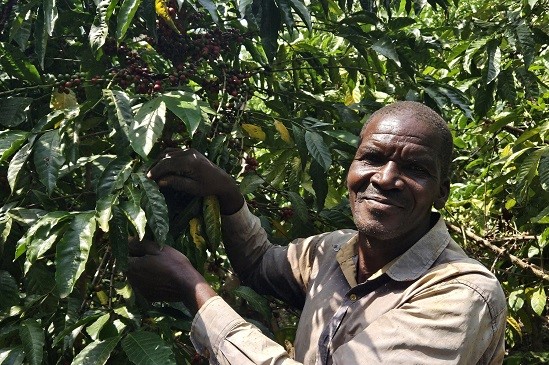In the burgeoning landscape of Northern Uganda, a remarkable transformation is underway as farmers are shifting their focus towards coffee cultivation, heralding a new era of economic prosperity and stability in the region.
Traditionally not synonymous with coffee production, the Northern region of Uganda has witnessed a remarkable shift in agricultural practices since 2014. Spearheaded by the Government in collaboration with the Uganda Coffee Development Authority (UCDA), a nationwide initiative was launched to revitalize the coffee industry and elevate production levels, which had stagnated at 3.5 million bags.
This initiative extended to the non-traditional commercial coffee areas, including the Mid-Northern Uganda districts of Apac, Gulu, Kitgum, Lira, Pader, Oyam, Amolatar, Dokolo, and Amuru. Consequently, coffee cultivation has flourished in the region, with reports indicating that the Acholi sub-region alone now yields over 500,000 bags annually.
Denis Okello, a visionary farmer from Adyaka village in Lira district, epitomizes this transformative trend. Formerly engaged in cotton, rice, soya bean, and sunflower cultivation, Okello heeded the government’s call to embrace coffee farming. In 2017, he took the plunge by planting Robusta Elite seedlings across 4.5 acres of his land. The success of his coffee venture has not only shattered preconceived notions but also underscored the viability of coffee farming in the region.
While Okello continues to cultivate other crops, his focus has shifted significantly towards coffee. His inaugural harvest in 2021 yielded an impressive 58 bags of dry cherries, translating to earnings exceeding Shs10 million. Buoyed by this success, Okello expanded his coffee plantation by an additional four acres in 2022, opting for the Coffee Wilt Disease Resistant KR varieties. His steadfast commitment to coffee farming is evident as he aims to surpass the 10-acre mark in the near future.
Despite encountering challenges such as erratic weather patterns, Okello remains undeterred, emphasizing the resilience and profitability of coffee cultivation. By strategically employing shade trees and implementing irrigation systems, including the recent construction of a dam, Okello ensures optimal growing conditions for his coffee plants.
An intriguing aspect of Okello’s farming methodology is his minimal use of fertilizers, relying instead on organic mulches derived from simsim and soya beans. This sustainable approach not only enhances soil fertility but also underscores Okello’s dedication to eco-friendly practices.
However, the scarcity of arable land poses a significant obstacle to widespread coffee cultivation in the region. Okello acknowledges this limitation, attributing his success to the availability of land. Nonetheless, he remains optimistic about the potential for coffee farming to thrive, especially as neighboring farmers draw inspiration from his achievements.
In addition to coffee, Okello diversifies his income streams by incorporating beekeeping, fish farming, and vegetable cultivation into his agricultural portfolio. Strategically placing bee hives beneath his coffee trees maximizes pollination efficiency while generating supplementary revenue through honey production. Furthermore, the construction of a dam not only facilitates irrigation but also presents opportunities for fish farming and vegetable cultivation, thereby enhancing Okello’s financial resilience.
In his appeal to UCDA, Okello advocates for the timely provision of plantlets to farmers, emphasizing the importance of early planting for optimal yields. He also underscores the value of regular farmer visits by extension workers, citing their role in fostering diligence and commitment among farmers.
As a trailblazer in coffee farming, Denis Okello’s journey serves as a beacon of hope and inspiration for farmers across Northern Uganda. His unwavering determination, coupled with innovative agricultural practices, epitomizes the transformative potential of coffee cultivation in securing a prosperous future for farmers in the region.















